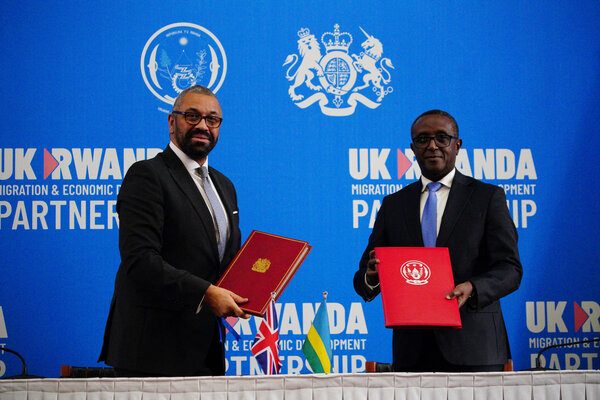UK Under Scrutiny for Rwanda Migration Treaty: Details Unveiled

The UK government’s recent signing of a migration treaty with Rwanda has stirred controversy and drawn attention to its efforts to address asylum seekers. The treaty, signed by Minister for Middle East and North Africa James Cleverly, aims to ensure the safety of individuals sent to Rwanda for asylum claims. However, the move faces legal and ethical challenges, especially after the UK Supreme Court unanimously ruled the government’s previous Rwanda deportation scheme as unlawful. Here’s an overview of the key provisions, legal issues, and the political fallout surrounding the new migration treaty.
Migration Treaty Provisions
The signed migration treaty includes several provisions to address concerns related to asylum seekers sent to Rwanda:
- Non-Refoulement Guarantee: The treaty asserts that individuals sent to Rwanda for asylum will not face the risk of “refoulement,” which refers to being sent to a third country where persecution might occur.
- Independent Monitoring Committee: A new independent monitoring committee will oversee Rwanda’s compliance with its obligations under the treaty, providing an additional layer of scrutiny.
- Judicial Oversight: British and Commonwealth judges will preside over a new appeals process, ensuring impartial adjudication in asylum cases.
- Financial Support: The UK commits to covering the accommodation and living expenses of individuals relocated to Rwanda for up to five years, reflecting a financial commitment to the success of the asylum process.
Supreme Court Ruling and Legal Challenges
The UK Supreme Court’s unanimous ruling deemed the previous Rwanda deportation scheme unlawful. The Court highlighted the lack of a proper assessment of Rwanda as a safe country for asylum seekers. Concerns about refoulement risk, violations of the European Convention on Human Rights (ECHR), and Rwanda’s human rights record were cited as grounds for the ruling.
Former Supreme Court judge Lord Jonathan Sumption criticized the government’s attempt to use legislation to bypass the Supreme Court ruling, deeming it “profoundly discreditable.” Legal challenges persist, with critics questioning the compatibility of the new migration treaty with international law.
Government’s Motivation and Challenges
The government’s motivation for pursuing the Rwanda asylum plan stems from a desire to deter illegal and perilous methods of entry, particularly the increasing numbers of arrivals via small boats across the English Channel. Prime Minister Rishi Sunak’s commitment to “stopping the boats” underscores the policy’s significance.
 UK PM Sunak faces party revolt after unveiling new Rwanda asylum plan
UK PM Sunak faces party revolt after unveiling new Rwanda asylum planDespite claims by the prime minister that the Rwanda plan would save billions in the long run, the government faces challenges in justifying the economic viability of the scheme. Cost estimates for removal to a third country, such as Rwanda, exceed the expenses associated with housing support for asylum seekers within the UK.
Conclusion
The signing of the migration treaty with Rwanda adds a new chapter to the ongoing saga of the UK government’s efforts to address asylum and migration challenges. Legal, ethical, and financial considerations will continue to shape the discourse around the treaty, with potential implications for the government’s broader immigration policies.

- Art
- Causes
- Best Offers
- Crafts
- Dance
- Drinks
- Film
- Fitness
- Food
- Jocuri
- Festival
- Gardening
- Health
- Home
- Literature
- Music
- Networking
- Alte
- Party
- Religion
- Shopping
- Sports
- Theater
- Wellness



